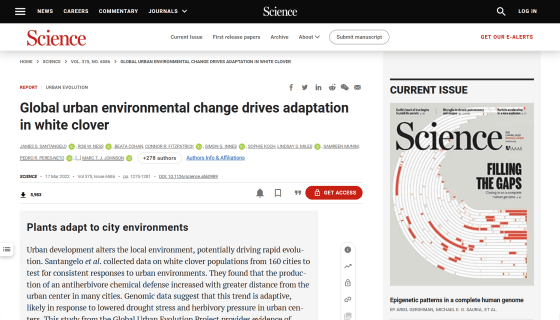Research results show that the 'city' created by humans is a major driving force for the evolution of living things.

It has been
Global urban environmental change drives adaptation in white clover
https://www.science.org/doi/10.1126/science.abk0989

New, clearest evidence yet that humans are a | Eurek Alert!
https://www.eurekalert.org/news-releases/946241
A New Study Has Identified a Dominant Force Driving Evolution on Earth Today
https://www.sciencealert.com/we-humans-are-now-a-dominant-force-driving-evolution-on-earth
The Global Urban Evolution Project (GLUE) , an international research team led by researchers at the University of Toronto, Mississauga , has collected more than 110,000 white clover samples in 160 cities and their suburbs in 26 countries, including Japan. We analyzed how human urbanization promoted global evolution across regions and climatic zones. White clover is a plant native to Europe and West Asia, but since it is found in almost all cities on the earth in modern times, it is useful for investigating the influence of the urban environment on evolution.
Analysis of the sample revealed that white clover growing in urban areas is more similar to white clover growing in distant cities than it is found in nearby farmlands and forests. The similarities that cities bring are stronger than the effects of climate, for example, white clovers growing in urban areas of Toronto are more similar to white clovers growing in urban areas of Tokyo than individuals growing in the surrounding forests. Was shown.
Science Alert, a scientific media outlet, points out that this is an example of parallel adaptive evolution by having different populations in different locations and the same selection pressure stimulating changes in specific traits . In other words, the selective pressure created by the human-created 'city' environment has a stronger impact on evolution than factors such as collective genetics and climate.

'There has never been a field study of evolution at this scale or a global study of how urbanization affects evolution,' said Marc Johnson, an evolutionary biologist at the University of Toronto, Mississaga. 'We have shown that this happens globally and often in a similar way.' 'For urbanization to drive parallel evolution, cities converge on environmental features that affect the fitness of living organisms.' Must be. '
The research team points out the difference in the amount of
James Santangelo, a doctoral student at the University of Toronto Mississauga, who led a collaborative research team, said, 'We know that for a long time we have changed the city quite deeply, dramatically changing the environment and ecosystems. 'But this study has shown that the same thing often happens on a global scale and in a similar way.'

'The city is where people live, and this study is the most compelling that we are changing the evolution of living things in it,' said Rob Ness, assistant professor at the University of Toronto Mississauga, who co-led the project. There is one proof. Beyond being an ecologist or an evolutionary biologist, this will have important implications for society. '
In addition, past studies have also confirmed changes such as 'the wings of swallows living in the bridge girders of concrete highways have become shorter' and 'the time when blackbirds start crying has become faster according to the rhythm of human life'. In addition, research results have been reported that 'urban mammals are becoming more nocturnal.'
The evolution of animals is also influenced by the 'city' created by humans-GIGAZINE

Related Posts:







